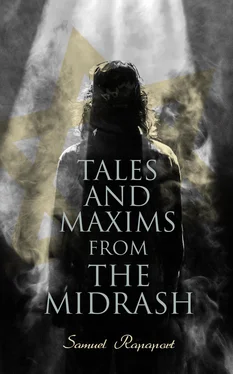Samuel Rapaport
Tales and Maxims from the Midrash
Interpretations and Commentaries on the Written & Oral Torah
e-artnow, 2021
Contact: info@e-artnow.org
EAN 4064066383947
Introduction
Alexander Of Macedon
Demons
Ashmedai, The King Of Demons
Messiah
Genesis Rabba
Exodus Rabba
Leviticus Rabba
Numbers Rabba
Deuteronomy Rabba
Midrash Ruth
Midrash Song Of Songs
Midrash Ecclesiastes
Midrash Lamentations
Midrash Esther
Midrash Psalms
Midrash Proverbs
Midrash Samuel
Table of Contents
JUST as the Written Law given by Moses emanates from God, whilst He Himself only proclaimed the first two commandments of the Decalogue, owing to the Israelites being too terrified to hear God's voice (Deut. 20. 19), and the whole of the Torah was then conveyed to Israel by Moses, so he likewise received the Oral law, which he was not allowed to commit to writing. This Oral law had to be taught by word of mouth side by side with the Written law, and thus the former became an unfolding and sequel to the latter.
This, says the Midrash,1 is meant by the words: 'Only take heed to thyself and keep thy soul diligently lest thou forget the words--דברים meaning "words" as well as "things"--which thine eyes have seen, and lest they depart from thy heart all the days of thy life' (Deut. 4. 9). 'The words which thine eyes have seen' means the Written words which can be seen, and 'lest they depart from thy heart' refers to the Oral law, words committed to memory, laid up in the heart.
From time immemorial, during the time of the prophets and even earlier, the Israelites had established schools or assemblies for the teaching of the Torah. To the places of worship schools were invariably attached in which religion was taught, the Torah was read and exegetically expounded. Whenever a portion of Holy Writ was read a דרש (Drash)--a searching inquiry--into the meaning of every sentence was made, with explanations drawn therefrom, based on the Oral law. Not only was this the case on Sabbaths and Festivals, but on week-days too, especially so on Mondays and Thursdays, when a small portion of the Torah was read, an institution ascribed to Ezra.2 Later on--probably in the time of the Maccabees--the reading of the prophets was also introduced.
The dissertations and expositions which were held were known as מדרש (Midrash), and this term was originally applied to both the הלכה (Halacha) and the אגדה (Agada).
The sermons, dissertations and expositions of whatever nature--whether exegetical, homiletical or ethical--were always given by word of mouth, but were after delivery reduced to writing. A knowledge of the Scriptures on the part of the audience was assumed, as the study of the Law was looked upon as one of the highest religious duties. There was great anxiety on the part of these teachers that nothing should be added to the Written law, which is known to us as the עשרים וארבע--the Canon of the twenty-four books.
There is this line of demarcation betweenהלכה (Halacha) and אגדה (Agada), which in course of time were separated from one another, though the former contains now and then a little of the latter, and vice versâ.3 Halacha, derived from הלך (to go, walk), is a term denoting laws regulating man's walk in life--the performance of his religious duties. The Aramaic translation of Onkeles (Exod. 21. 9) gives הלכה as an equivalent of משפט. Halacha, when decided by a majority of the school, became incontrovertible, law that could not be gainsaid; and any one, no matter how great his reputation for piety and learning, who might attempt to impugn it, would be excommunicated. Thus we find such lights amongst the Rabbis as Eleazer B. Hanoch, who, having questioned the Halacha on 'Purity,' was put under the ban, in which he remained all his life, and a stone was thrown on his coffin, since he had died under sentence. Akabyah b. Mahalalel was similarly excommunicated for refusing to accept the decision of the majority on four questions, and Rabbi Eliazar b. Horkynas, too, was put under the ban for declining to recognize the decision of the majority on some points. The names of the respective authorities in the Halacha were always retained.
The Agada, on the other hand, is a free interpretation of the Scriptures. As its name implies: 'It was said.' Its assertions were not incontrovertible or not to be gainsaid. There was, on the one hand, strong opposition to the Agada; but, on the other hand, it was very highly esteemed by most, and not every one was considered qualified to handle it. Even Rabbi Akiba received a mild rebuke when he tried to dive into the depths of this method of teaching.4 There grew up in the course of time a saying: 'If you desire to find the greatness of the Creator, study the Agada.' The names of the Agadic teachers were not always mentioned, yet certain rabbis were known to have possessed an enviable capacity for this branch of religious instruction, such as Rabbis Abahu, Ishmael, Eliazar b. Azaryah, Eliazar b. R. José the Galilean, and others, and they were known as the Rabbis of the Agada.
The Agada, of which the various Midrashim contain collections, and which some of the Apocrypha have for their source, was written in the time of the Tanaim, and consequently before the Halacha, which was only taken in hand by the school of Rav Ashé.
Whilst the Agada seeks but free scope in its own teachings and in its own interpretation of Scripture, and does not intend to invade the domain of Halacha, it yet occasionally touches some legal points. It is the oldest exegesis of the Scriptures, and contains in its elevating teachings, sermons, prayers, homilies, historical records, exhortations, admonitions and consolations, conveyed frequently in allegories, legends, parables and similes.
From the time of Ezra there were many institutions for the diffusion of this kind of teaching by the Scribes and priests. It formed the vital element in the nation's morality. When the Scribes took the place of the prophets, their interpretation and exposition of the Scriptures also took the place of prophetic utterances. In prosperity the people's favourite was the Halacha,5 but in adversity they preferred attending Agadic expositions, containing as they did--among much else--words of comfort and consolation, instilling faith in God and hope in His help and protection.
Rabbi Abahu and Rabbi Chanina b. Abbé were holding discourses at the same time; the former preaching on Agada and the latter on Halacha. Rabbi Chanina's audience, hearing of Rabbi Abahu's Agadic discourse, rudely left him, and went to hear the latter. This gentle sage, distinguished for his meekness and piety, felt aggrieved at the slight shown to his colleague, of which he was the innocent and unwilling cause. He went to see Rabbi Chanina and tried to assuage the grief caused him. 'It is hardly to be wondered at,' he said, 'that the people come to hear me instead of craving for your words. For do we not find this folly in almost every walk of life? Let a man offer cheap and flimsy finery for sale, and he will find far more buyers than he who offers choice pearls and precious stones.'6 The Rabbis knew well how to make their Agadic discourses as attractive as possible, and to awaken their audience from their lethargic condition when occasion arose. One device was to use words of foreign languages, Latin, Greek, Persian, etc., in order to provoke questions and further interest, and so well was the Agada known for its foreign words, that if one found in the Mishna a word of doubtful meaning, recourse was had to the written Agada for its elucidation.7
Rabbi Akiba, once finding his audience drowsy and inattentive, used the following device: 'What,' he asked, 'induced Esther to reign over 127 provinces?' The question at once roused the attention of the whole assembly, who expected some subtle arithmetical solution, with which the Rabbi had no intention of edifying them. But finding his device successful and attention awakened, he answered the question by saying that 'it was proper for the descendant of Sarah, who lived 127 years, to reign over 127 provinces.'8
Читать дальше












